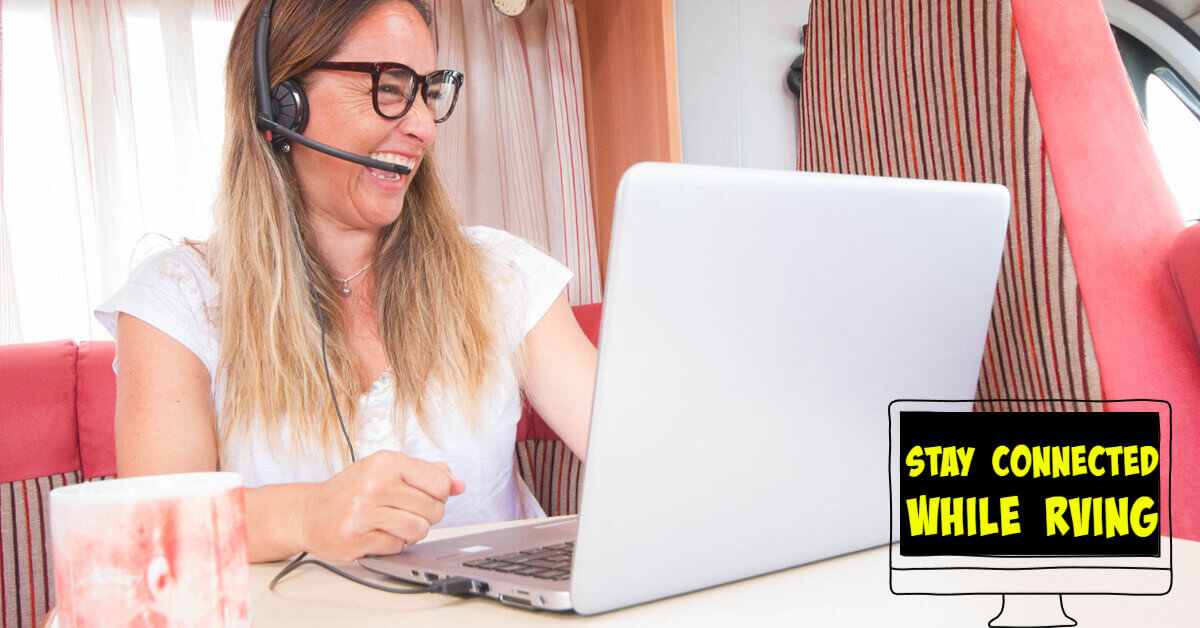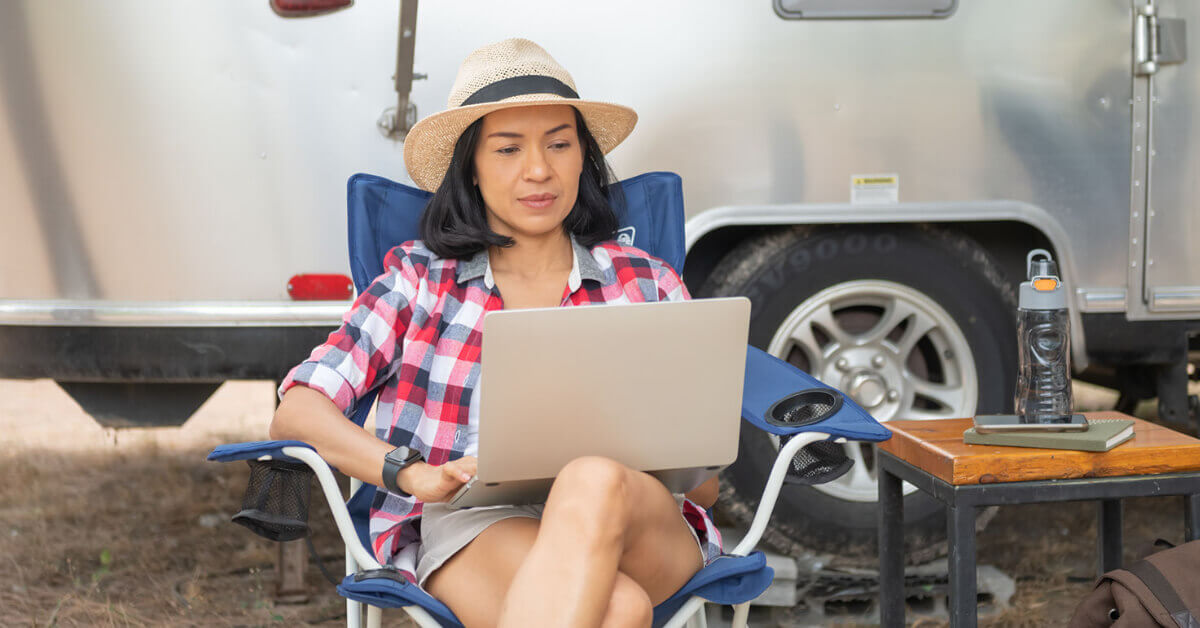- Home Page
- Favorite RV Accessories
- Stay Connected While Rving
How to Stay Connected While RVing: Tips and Tricks
How to Stay Connected While RVing: Tips and Tricks
Are you intending to taking a road trip in your RV but are concerned about maintaining internet and cell phone connectivity? Don't worry; we've got you covered! This article will provide tips and tricks to help you stay connected while RVing.
1. Understanding the Different Types of
RV Internet Connection
Before jumping into the tips and tricks, it's essential to understand the various kinds of internet connections available for RVs. There are three types of RV internet connections: cellular, satellite, and WiFi. Each has pros and cons, and it's important to understand which one suits your needs.
Cellular Internet Connection
A cellular internet connection uses a cellular network to connect to the internet. It's the most common type of internet connection used by RVers. It's fast, reliable, and offers good coverage in most areas.
Satellite Internet Connection
A satellite internet connection uses a satellite to connect to the internet. It's more expensive than a cellular internet connection but offers better coverage in remote areas.
WiFi Internet Connection
A WiFi internet connection uses a wireless network to connect to the internet. It's the cheapest option but has limited coverage and is unsuitable for remote areas.
2. Boosting Cellular Signal
If you've decided to go with a cellular internet connection, it's vital to boost your signal to get the best possible connection. Here are some tips to help you boost your cellular signal:
Use a Signal Booster
A signal booster amplifies your cellular signal and improves your connection. It's more expensive but worth the investment if you'll be on the road for a long time.
Move to a Higher Ground
Higher ground provides a better cellular signal. If you parked your RV in a low-lying area, try to move to higher ground to get a stronger signal.
Use a Directional Antenna
A directional antenna focuses your cellular signal in one direction, improving your connection. It's more expensive than an omnidirectional antenna but offers better performance.
3. Choosing the Right Cellular Plan
Choosing the right cellular plan is essential to get the best possible connection. Below are a few pointers that can assist you in selecting the appropriate cellular plan:
Check Coverage Maps
Check the coverage maps of different cellular providers to see which offers the best coverage. Choose a provider that provides a good range in the areas you'll be traveling to.
Choose an Unlimited Plan
An unlimited plan is ideal for RVers as it offers unlimited data usage without caps or throttling.
Look for Discounts
Many cellular providers offer discounts for RVers. Look for those discounts to save money on your cellular plan.
4. Installing a Satellite Internet System
If you're traveling in remote areas with no cellular coverage, a satellite internet system is your best bet. Here are some tips to help you install a satellite internet system:
Choose the Right Satellite Provider
The most popular Satellite Providers are Starlink, HughesNet and ViasatInternet. Choose a satellite provider with good coverage in the areas you'll be traveling to. Look for providers that offer flexible plans and good customer support.
Install the System Properly
If you're traveling in remote areas with no cellular coverage, a satellite internet system is your best bet. Here are some tips to help you install a satellite internet system:
5. Using WiFi Hotspots
WiFi hotspots are a fantastic way to save money on your internet connection. Below are some pointers that can assist you in discovering WiFi hotspots:
Use WiFi Finder Apps
WiFi finder apps help you find WiFi hotspots in your area. Download such apps on your smartphone to find hotspots easily.
Look for Free WiFi
Many businesses offer free WiFi to their customers. Look for such companies in your area to save money.
6. Setting up a WiFi Network
Setting up a WiFi network in your RV is another option to stay connected. The tips below will help you set up a WiFi network:
Use a WiFi Extender
A WiFi extender amplifies your existing WiFi signal and extends its coverage area. It's a great option if you're parked in an RV campground with a weak WiFi signal.
Use a MiFi Device
A MiFi device is a portable hotspot that connects multiple devices to the internet. It's a great option if you're traveling with a group.
Choose the Right Router
Choose a router that's suitable for your needs. Look for routers with good coverage, security features, and easy to set up.
7. Managing Data Usage
Managing your data usage is important to maintain your monthly data allowance. These tips to help you manage your data usage:
Use Data Management Apps
Data management apps help you track your data usage and avoid exceeding your monthly data allowance. Download such apps on your smartphone to manage your data usage effectively.
Use a Data Usage Monitor
A data usage monitor alerts you when you're about to exceed your monthly data allowance. It's an excellent tool for managing your data usage effectively.
Use a WiFi Range Extender
A WiFi range extender allows you to use WiFi hotspots from a distance. It's a great option if you're parked far from a WiFi hotspot and want to avoid using your cellular data.
8. Security Considerations
Staying connected while RVing also involves some security considerations. These tips will make sure you stay safe online:
Use a VPN Network
A VPN (Virtual Private Network) will encrypt your internet traffic and keep your online activities private. It's a great tool to stay safe online, especially when using public WiFi hotspots.
Update Your Software
Updating your software, including your operating system and antivirus software, is essential to stay protected from online threats.
Use Strong Passwords
Using strong passwords for your online accounts is essential in preventing hackers from accessing your personal information.
9. Additional Stay connected while RVing Tips and Tricks
The additional tips and tricks below will help you stay connected while RVing:
Research Your Campground
Before you head to a new campground, research its internet connectivity options. Check the campground reviews and see what other RVers say about their internet connection.
Use a Signal Booster
A signal booster amplifies your cellular signal and improves the quality of your calls and data connection. It's a great option if you're traveling in areas with weak cellular signals.
Download Entertainment
Downloading movies, TV shows, and music before hitting the road can help you stay entertained while traveling. It can also save your data allowance.
Backup Your Data
Backing up your data is important to prevent losing your files and documents. Use a cloud storage service to back up your data regularly.
Conclusion
Staying connected while RVing can be challenging, but it's not impossible. Following the stay connected while RVing tips and tricks in this article, you can stay connected while on the road and enjoy your RVing experience. Whether you're working remotely, staying in touch with friends and family, or just browsing the internet, many options are available to keep you connected.
FAQs
Can I use a WiFi booster instead of a WiFi extender?
Can I use a WiFi booster instead of a WiFi extender?
No, a WiFi booster and a WiFi extender are not the same. A WiFi booster amplifies your existing WiFi signal, while a WiFi extender extends its coverage area.
How do I know if a campground has good internet connectivity?
How do I know if a campground has good internet connectivity?
You can research the campground online and read reviews from other RVers. You can also call the campground and ask about their internet connectivity options.
What's the best satellite internet provider for RVers?
What's the best satellite internet provider for RVers?
The best satellite internet provider for RVers depends on your needs and location. Some popular satellite internet providers for RVers include Starlink, HughesNet and Viasat.
How can I reduce data usage while I'm RVing?
How can I reduce data usage while I'm RVing?
You can reduce your data usage by using data management apps, using a WiFi range extender, and downloading entertainment before hitting the road.
Is it safe to use public WiFi hotspots while RVing?
Is it safe to use public WiFi hotspots while RVing?
Using public WiFi hotspots can be risky, as it can expose your personal information to hackers. A VPN network is recommended to stay safe online while using public WiFi hotspots.



Comments
Do you have a comment on this topic? You can leave your comment in the box below.